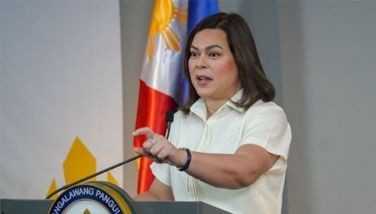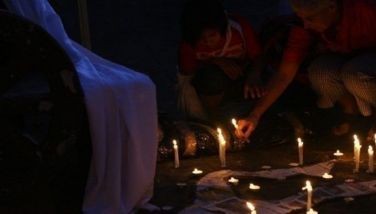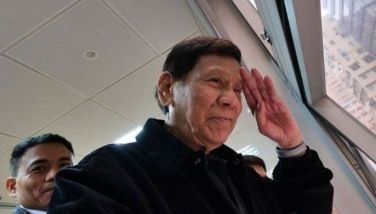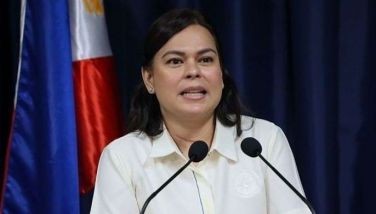Redefining women empowerment for President Rodrigo Duterte
Day by day as the presidential inauguration approaches, President-elect Rodrigo Duterte surprises the nation with phenomenal mobilization of forces to combat crimes, imposing a 72-hour deadline on government transactions, confronting transport crises with emergency powers, etc.
Yet even during the presidential campaign this “probinsyano” (country bumpkin) scandalized the whole country with lack of good taste recalling the rape and killing of an Australian lady missionary in a Davao penitentiary, questioning his suitability as a president. But recently the warmest complement he received was from his own daughter Sara and son Sebastian, “He was not always within reach but he certainly was no absentee father when we were growing up.” Sara also recalled that her father placed a high value on education, “Education is everything,” sounding almost like a broken record. In fact, included in Duterte’s eight-point economic agenda is the strengthening of basic education, the provision of equality in education for women, and the granting of scholarships for tertiary education, that are relevant to the needs of private-sector employers.
How women are marginalized
It is believed that an estimated 759 million adults – 16 percent of world population aged 15 and above – lack the basic three R’s needed in everyday life. More than half live in South and West Asia (391 million), and almost two in every three adult illiterates are female.
There is a strong interconnection of women empowerment to all the eight Millennium Development Goals (MDG) of UNESCO. So long as women are allowed free time to acquire quality Basic Education, she will persist in protecting her family from poverty and hunger (MDG 1). However, women are still seen in the traditional role of staying at home: baby-sitting for younger siblings, keeping house, cooking and farming. Even parents disregard the importance of schooling for their daughters so they are frequently absent. They consider it more important for their sons. Parents of Lumad tribal girls in Bukidnon encourage them to get married at the age of 12 unless they can continue their scholarship up to high school.
Being more biologically vulnerable compared to the males, women cannot properly assert their human rights to secure reproductive health and bear healthy and intelligent babies (MDG 3, 5, and 6). “Gender disparity” also exposes them to domestic violence.
Women empowerment to achieve all MDG goals
The question confronting us this year is “Have the UN Millennium Development Goals (2000-2015) been achieved in the Philippines?” Women empowerment remains the basis of achieving all eight MDG goals. UN Millennium Task Force on Education and Gender Equality has identified seven interdependent strategic priorities for achieving gender equality and women’s empowerment:
(i) Strengthen opportunities for post-primary education for girls (Goal 2); (ii) Guarantee sexual and reproductive health and rights for women and girls (Goals 3, 5 and 6); (iii) Invest in infrastructure to reduce the time spent by women and girls on unpaid household and care work (Goals 1 and 2); (iv) Guarantee property and inheritance rights for women and girls (Goals 1, 2 and 7); (v) Eliminate gender inequality in employment by reducing women’s dependence on informal employment (Goal 3); (vi) Increase women’s share of seats in national parliaments and local government bodies (Goal 3); and (vii) Eliminate violence against girls and women (Goal 3).
Three target groups of women require special attention: poor women in the poorest countries, adolescents who can improve the rest of their lives, as well as women and girls in conflict and post-conflict situations.
Teach the mother, teach the nation
In 1986, Foreign Affairs Minister Salvador Laurel appointed me to represent the Philippines in the UNESCO Executive Board in Paris, where I was elected for a two-year term. This was exactly 20 years after I started the Operation Brotherhood Montessori schools as a non-stock, non-profit institution, which was first financed by Operation Brotherhood International, a volunteer organization that medically helped refugees of Vietnam and Laos as well as relocated 3,000 squatters from Intramuros and refugees of Taal Volcano to Sapang Palay.
The cross-cutting theme then of UNESCO was the eradication of poverty through literacy. The Asia Pacific literacy campaign was named APPEAL. Its objective was no longer to achieve just plain reading, writing and arithmetic but “functional literacy” as well. By coincidence, in the same year, I had then been collaborating with sugar planters in Cadiz and Sagay, Negros Occidental in providing Mothercraft literacy training for the village mothers. I proposed the setting up of a furnished dining-living room, kitchen, bedroom with a toilet-bath outside, to serve as the training laboratory for personal grooming, housekeeping, childcare and food preparation.
At that time, there was a drastic drop of sugar price in the world market which caused the unemployment of the Negrense farmers. Assisted by haciendera Punay Kabayao Fernandez, Cadiz Mayor Rowena Guanzon and Mayor Joseph Maranon, I set up two non-formal literacy schools in Cadiz and Sagay. Fourteen more hacienderos sent mothers from their plantation providing them transport and allowance for lunch preparation.
Mayor Guanzon built a huge multi-purpose bahay-kubo (nipa hut) that housed the twin literacy training program for mothers and their preschoolers. She enlisted the help of the Cadiz Normal University in recruiting teachers so we could give them a proficiency course to be Pagsasarili preschool teachers. Punay’s daughter, Tamsi, and Paz Babalcon, one of my senior OB Montessori preschool teachers, worked with this project until 1988. They assisted me in writing an illustrated English-Tagalog literacy manual, which was published 20 years later. The most prominent chapters were on Pre-Natal and Post-Natal Care and the Literacy section.
A systematic literacy course for village parents and children
To help launch the first Pagsasarili Mothercraft Literacy Twin Center, Secretary of the Ministry of Education, Culture and Sports (MECS) Dr. Lourdes Quisum-bing traveled by Roro to Bacolod then to Cadiz from an Education event in Iloilo to witness the graduation of 20 village mothers. All dressed in white, several borrowed from friends, they demonstrated Personal Grooming, Housekeeping and the use of the Language, Math and Geography materials. Some worked together with their preschool children. (Yearly since then, Pagsasarili preschool graduates do the same demonstration on stage.) Dr. Quisumbing watched with delight. She remarked, “This is so innovative – ‘mother and child learning together.’ This is the real revolution, a daily and real exercise of good work, not a one-day EDSA revolution.”
The Pagsasarili principles of work were easily implemented. Work is a recipe complete with ingredients and step-by-step procedure. For example, Personal Grooming uses a tray with baby powder, comb, lipstick and eyebrow pencil and pouch of tawas (alum powder deodorant). The husbands were amazed by their wives’ transformation.
Work is made up of small steps, which must follow each other in an orderly sequence; example laundering starts with wetting a garment, soaping until sudsy, rinsing, squeezing, and hanging over the laundry wire. Error is a friendly reminder. One mistake of mixing black garments with white ruins the whole laundry work. Next opportunity makes one isolate black clothes to wash. At Stanford University in California, this type of work with precision is called “engineering of movement.”
Protecting the rights of the child for quality parenting and schooling
Between 1983 and 1985, Mayors of Quezon City, San Juan, Pasay, Caloocan, Pasig and Las Piñas signed MOAs with the OB Montessori Child and Community Foundation to provide part of the barangay hall as Pagsasarili Preschool sites — rent free. Teachers recruited from the vicinity with the help of the Community Relations office of the National Housing Authority were trained in the Pagsasarili system. To make the project economically sustainable, parents paid an affordable monthly tuition fee of P20 which increased yearly. Now, after 31 years, enrollment is in full swing and parents pay P1,500 monthly providing better salaries for two to three teachers who handle morning, noon, and afternoon sessions per site. This has made the project financially sustainable.
In 1990, the Philippines ratified the Convention on the Rights of the Child (CRC) which emphasized the Filipino child’s right to quality parenting and schooling. UNESCO also launched Education for All (EFA) program in Jomtien, Thailand. In 2000 after 10 years, EFA evaluation in Dakar showed increased enrollment in developing countries, but quality teaching was missing. To showcase quality public school, the OB Montessori Foundation piloted the Pagsasarili EFA-DAKAR Grade School at the Pulung Bulu Public School in Angeles, Pampanga. My husband Max invited five donor companies to reconstruct a lahar-damaged schoolhouse within the campus into nine classrooms adding a second floor for the integrated high school. Mayor “Tarzan” Lazatin helped provide salaries of some teachers who had no items.
From 2000 up to 2003, seven Mayors of the Rice Terrace sites in Ifugao cooperated with our Montessori Child and Community Foundation to use the Pagsasarili system charging only P200 to P350 monthly tuition fee. Between 2005 up to the present, Vilma Santos Recto, mayor of Lipa, had 60 day care centers converted to Pagsasarili preschools. Now as Batangas governor, she has added 55 more.
The treasures within
Parents and public school teachers of Pagsasarili preschoolers have a continuous testimony of their miraculous transformation in character. This has been accompanied by their academic acquisition of third grade competence and ability to speak English. These children’s love for work, order, self-confidence and independence are treasures that will last a lifetime.
- Latest




























